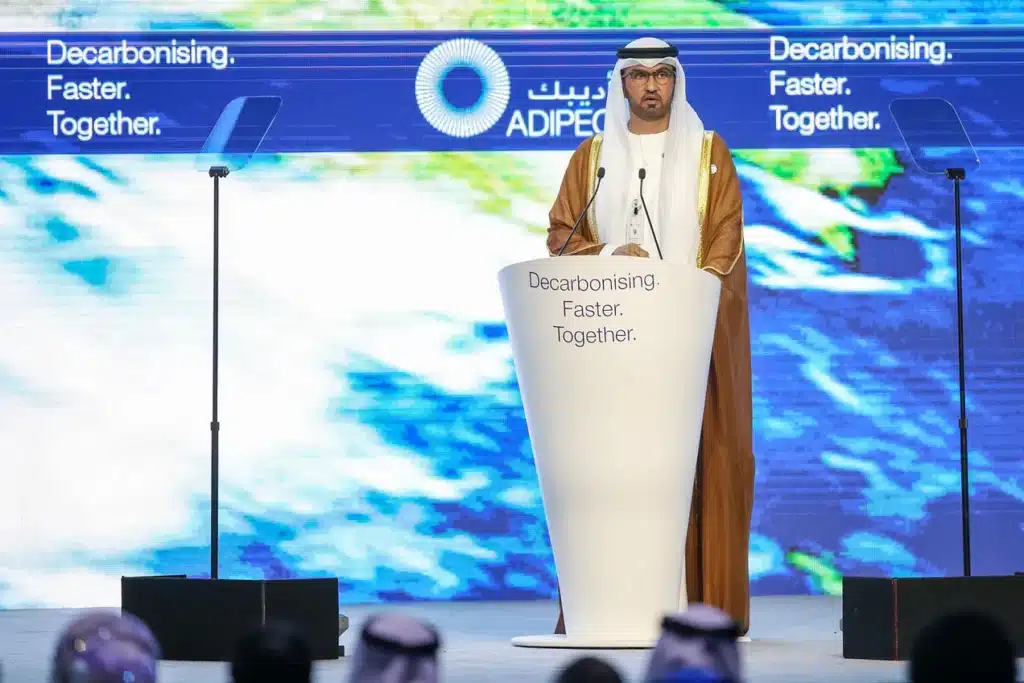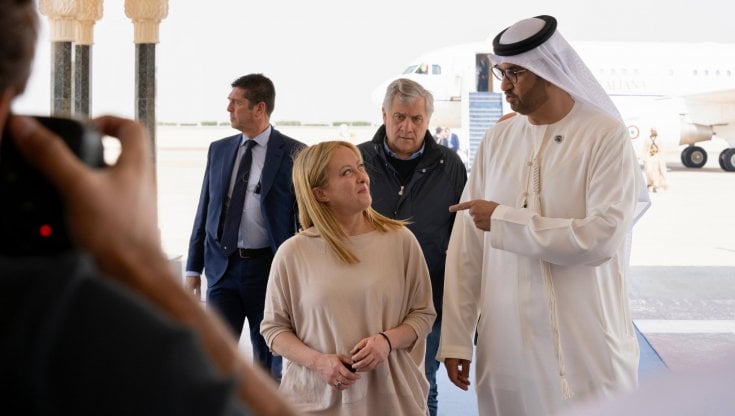While the UN urges the world to quickly abandon fossil fuels, new documents confirm that the COP28 hosts want exactly the opposite. The target? Expand oil and gas by signing new agreements with a series of countries, including Italy. An unprecedented mockery.
The documents obtained from the Center for Climate Reporting and already anticipated in a shortened version from the BBC show the Emirates intent on using COP28 to pursue expansion and new investments in oil and gas. A heavy slap in the face of the fight for change and a sign that perhaps this conference formula is irreparably compromised.
COP28 as a cover for dirty business
The reports released include “talking points” for conversations between the Sultan Ahmed Al-Jaber, president of COP28 and delegations from at least 28 countries. This is not surprising, considering the fact that Al-Jaber is the head of the Emirati oil company. And that he has already had the opportunity to express (in audio released in recent days) his position in favor of the use of fossil fuels.
An oilman at the head of the Climate Conference: is there anything more incredibly dissonant in the world?

COP: from “Conference of the Parties” to “Conference of Petroleum” it is a short step.
The Presidency's objective, according to the above-mentioned reports, is to use the discussion platform to propose joint ventures in new oil and gas projects. For example, infrastructure to export liquefied gas to China and Asia from Australia or Canada. In the eyes of the world, mega-investments in infrastructure passed off as "decarbonization".
But the Emirates are not alone. Related documents reveal that Saudi Arabia is also committed to promoting fuel consumption in Africa and Asia. The Kingdom aims to retain new "customers" dependent on highly emissive and profitable resources. As? With a program called Oil Development Sustainability Program (ODSP) which in fact supports the adoption of super-polluting cars and fuels.
Mohammed Adow, veteran Kenyan activist and policy advisor, directs PowerShift Africa, a think tank that promotes climate justice. And he calls the ploy of “Oil Country” and fossil lobbyists “simply disgusting.” They are like drug dealers, he says, who are turning entire countries into their "drug addict" customers, without any shame or stated claim to sustainability.
What role will Italy have?

It is not clear whether and with which countries the Emirates have actually concluded oil agreements already during the talks leading up to COP28 in Dubai. But the recurring question is: which nations legitimized these plans or even joined them? Unfortunately for us, Italy is most likely also there.
The recent talks between the Italian Prime Minister Giorgia Meloni and representatives of the United Arab Emirates, including Sultan Al Jaber, score a significant strengthening of relations between Italy and the Emirates.
During his visit to Abu Dhabi in March 2023, Meloni met with the President of the Emirates, Sheikh Mohammed bin Zayed al-Nahyan, expressing the strong desire of both parties to rebuild excellent relations and friendship, thus revitalizing a historic but recently fractured strategic partnership. During the visit, a Memorandum of Understanding was signed between Claudio Descalzi, CEO of Eni, and Al Jaber himself. The agreement would formally focus on “gas emissions reduction, the development of green and blue hydrogen, and CO2 capture and storage technologies.” In light of the latest developments, I wonder what the true ultimate direction of these agreements is.

Nothing new
If you have increasingly doubted the usefulness of these climate conferences and their beautiful proclamations already ignored several times, know that history is made to repeat itself. Always.
This situation closely resembles the strategies adopted by tobacco companies, which, faced with restrictions in developed markets, have turned to emerging markets to maintain their profits. Similarly, oil-producing nations seek to exploit new markets to continue to profit from a declining industry.
And they do so by transforming COP28 into an exchange hub to convey their interests. Having lifted the veil on this reality, all that remains is regret. Closing the climate discussion in an ivory tower, a bandwagon increasingly disconnected from reality, has done nothing but make it easy prey to strong economic interests that have eroded it from within.
COP28: what now?
Far be it from me to throw out the baby with the bathwater (because it is polluted), but the compromise of COP28 is a reality that we absolutely must deal with. I have no doubt that there are a huge number of people, organizations and countries genuinely committed to fighting pollution and climate change. If we don't get anything out of these great events, however, there are very specific reasons.
Done thing, boss ha.
Having established that placing expectations on a "global festival" where fossils are sold in green-painted pavilions and, fundamentally, the world population is deceived, the challenge now is how the international community and environmental movements will respond to these tactics.
Will they be able to counter Big Oil's influence, not only in their domestic policies but also in the global context of the fight against climate change? Someone, at least someone (I beg you) does not take this as a rhetorical question.


